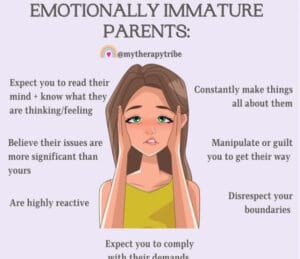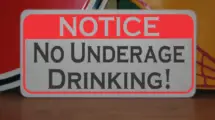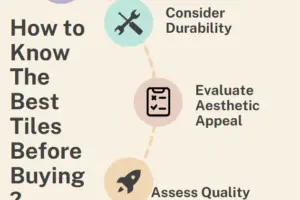Dealing with parents who aren’t good at handling feelings can be tough. It affects you when you’re a kid and even when you grow up. These emotionally immature parents might act like they’re younger than they are, making things more complicated.

Types of Emotionally Immature Parents
- Self-Centered Parents: They care more about themselves and don’t pay attention to what you need or how you feel.
- Passive-Aggressive Parent: They show their anger in sneaky ways, like making you feel guilty. They don’t deal with issues directly and might put their emotional stuff on you.
- Enmeshed Parent: These parents get too involved in your life, making it hard to know where you end, and they begin. They might rely on you for support, which isn’t healthy.
- Emotionally Unavailable Parent: These parents are distant and don’t show emotions. It feels like they’re not there for you.
Signs of Emotionally Immature Parents
five signs that can indicate parents might be emotionally immature:
- Self-Centeredness: Emotionally immature parents often focus mainly on their own needs and feelings, neglecting those of their children. They may seem more interested in getting what they want than understanding or supporting their kids emotionally.
- Lack of Empathy: These parents might struggle to put themselves in their children’s shoes. They may not grasp or respond to their kids’ emotions, making it challenging for the children to feel understood or supported.
- Difficulty Handling Conflict: Emotionally immature parents often find it hard to deal with disagreements or challenges in a healthy way. They might react with anger, defensiveness, or avoidance instead of engaging in constructive communication.
- Inconsistency in Parenting: Parents with emotional immaturity may be inconsistent in their behavior and reactions. One day they might be overly involved, and the next they might be distant. This inconsistency can confuse children and create an unstable emotional environment.
- Dependency on Children for Emotional Support: Emotionally immature parents may rely on their children for emotional validation and support, which is unhealthy. Children should not be burdened with the responsibility of taking care of their parent’s emotional needs.
Why Parents Can Be Like This
Some parents struggle with being emotionally mature, and this can cause big problems in their relationship with their kids. Let’s break down some reasons why this happens:
- Bad Childhood Experiences: Bad stuff happening in childhood, like abuse or not getting enough love, can mess up how someone handles emotions. This might make it hard for them to have good relationships and do right by their kids.
- Mental Health Issues: If parents have problems like depression, anxiety, or addiction and don’t get help, it can mess with how they handle feelings and talk with their kids.
- Not Knowing Themselves: Some parents just don’t get how their emotions work, so they don’t see when they’re acting a certain way. This can make them defensive and avoid taking responsibility for what they do.
- Bad Ways to Deal with Stress: Some parents deal with stress by doing things that hurt them and their families, like using drugs, getting super mad, blaming others, or ignoring their family.
- Thinking Everything Should Be Perfect: Some parents expect too much from themselves and their kids. This leads to fights and frustration, especially if their idea of perfect is different from what their upbringing taught them.

What Happens to Kids of Emotionally Immature Parents
Growing up with parents who can’t handle their feelings can mess with a kid. Let’s see how it can affect them:
Emotional and Psychological Consequences
- Low Self-Esteem: Kids might feel bad about themselves because they take in their parents’ negative stuff.
- Anxiety and Depression: Living in a home with lots of ups and downs can make kids feel super worried or sad.
- Emotion Trouble: Kids might find it hard to understand and healthily show their feelings, leading to meltdowns or hurting themselves.
- Attachment Issues: It’s tough for kids to trust and have good relationships when their parents don’t give them steady love.
- Fear of Being Left Alone: If parents are sometimes there and sometimes not, kids can get scared of being left behind or not wanted.
Social and Relationship Consequences
- Problems Making Friends: Kids might struggle to understand how to make friends or be good friends because they didn’t learn it at home.
- Relying Too Much on Others: Kids might try too hard to get their parents to like them, even if it’s not healthy.
- Thinking Relationships Should Be Perfect: Kids might think that relationships always have to be perfect or end up with people who are not good for them.
- Trouble Setting Boundaries: Kids might find it hard to say no or protect themselves from being treated badly.
Behavioral Consequences
- Acting Out: Kids might show how upset they are by being angry or causing problems.
- Turning to Substances: Some kids might use drugs or alcohol to deal with the pain and tough emotions at home.
- Problems in School: The stress at home can make it tough for kids to focus on school and do well.
- Harming Themselves: Kids might do things like hurting themselves, having eating issues, or doing risky stuff to cope with how they feel.
Getting Help from Emotionally Immature Parents
If you think your parents are emotionally immature, you’re not alone. There are ways to deal with it:
- Therapy: Talking to someone can help you understand and handle things better.
- Support Groups: Meeting others who’ve been through the same stuff can be powerful.
- Books and Resources: Learning about emotional immaturity can give you tools to deal with your parents.
Avoiding Being Like Them
If you’re a parent or want to be one, you can keep from being emotionally immature by:
- Knowing Yourself: Think about how you feel and how it affects your relationships.
- Handling Stress Well: Learn to deal with tough times without making things worse.
- Putting Your Kid First: Make sure your child feels safe, loved, and important.
- Getting Help If You Need It: Don’t be afraid to ask for support if you’re struggling.
FAQs About Emotionally Immature Parents
- Can they Change? Yes, if they’re willing to work on it with therapy and self-awareness.
- Can You Have a Good Relationship? It’s possible, but it means setting limits and explaining what you need.
- Should You Cut Them Off? It’s a big decision that needs careful thought and looking at all the options.
Conclusion
Growing up with emotionally immature parents is hard, but you’re not alone. There are ways to understand and cope with their actions. Remember, you deserve love and support



















































